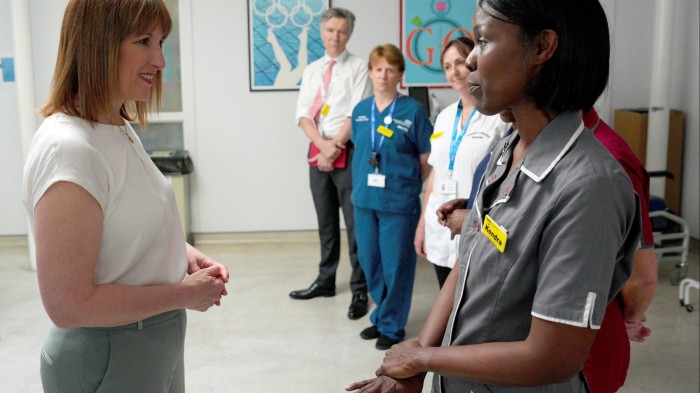Unlock the Editor’s Digest for free
Roula Khalaf, Editor of the FT, selects her favourite stories in this weekly newsletter.
Rachel Reeves is banking on big productivity gains from the adoption of AI across the UK government to help deliver efficiency savings totalling £14bn by the end of the parliament.
The chancellor said she had been “relentless” in driving out inefficiencies in order to put money back into public services in the spending plans she set out on Wednesday.
Most government departments have committed to deliver efficiency gains worth at least 3 per cent of their day-to-day spending by 2028-29, with some set to save 8 per cent or more.
Departmental efficiency plans published by the Treasury show the bulk of these savings are supposed to flow from the NHS productivity plan, which targets efficiencies of almost £9bn a year by 2028-29 — backed by investment of £10bn in technology and digital transformation.
But Reeves is also counting on a rollout of AI and automation across government — both in public-facing service delivery and in the daily work of officials — to effect a “major overhaul in . . . productivity and efficiency”.
Analysts question whether this will be achievable. Yael Selfin, chief UK economist at KPMG, said productivity increases would be “difficult to attain” as initial investments in digital technologies and AI “may be difficult to implement”.
One example of promised gains is the Ministry of Justice’s plan to pilot tech-enabled remote check-ins for offenders in the community, aiming to free up 27,000 hours of probation staff time a year.
The department said this, combined with a rollout of AI to streamline routine tasks, would account for almost a third of the total efficiency gains of £356mn it is targeting.
The Department for Work and Pensions said it was deploying AI to help advisers identify vulnerable customers and to scan CVs in job centres. These, and other digital improvements, will account for £177mn out of a total £312mn efficiency gains by 2028-29.
The Home Office, Ministry of Housing and Department for Energy Security and Net Zero are also counting on “integrating AI into the working habits of staff” in order to cut the amount of time officials spend summarising, drafting and taking notes.
The Department for Transport, which is facing one of the tightest departmental settlements, is explicit that it is counting on making greater use of AI and digital tools in order to cut jobs.
But even in the Department for Science, Innovation and Technology — which claims it will serve as “an exemplar of modern, digital government” — AI and automation will not be enough to deliver savings on the scale Reeves has demanded.
More traditional cost-cutting, including job cuts at senior level and a clampdown on consultants, will play a bigger role, the costings show.
Along with workforce reform and cuts to consultancy spending, the Treasury is calling for old-fashioned penny-pinching in procurement — and a crackdown on “wasteful” staff away days and branded merchandise.
Ben Paxton, a senior researcher at the Institute for Government, questioned the scope for AI-driven savings, saying that while the government was right to be “on the front foot” in setting out how it would make savings, it did not remove “the need to invest in basic digital infrastructure”, in the NHS in particular.
“AI is often not the barrier. It’s the printer working, or being able to log on to a computer. The capex for public services is going to have to come alongside that for it to translate into efficiency savings.”




